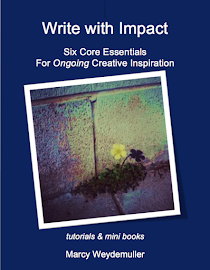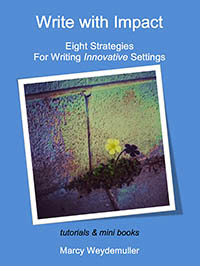Thursday, March 29, 2018
Journal With Impact: Vocation Set Goals
Workshop:
Six Conversations for Writing Creative
Journals
“The
writer who observes the battlefield before entering the fray will be better
equipped to plan strategy and tactics.” James Scott Bell
Whatever
your projects are—it’s not a contest but individual growth toward discovery and
excellence. Some parts will come easier than others and our creative process
varies. Sometimes we shut down for a while, and if we do, we need to ask why,
not to lay blame on ourselves but to recognize if we need to replenish our
creative possibilities. Perhaps we’ve become overextended and need time to
rest.
Setting
specific goals enables us to roadmap the process with anticipation even when
obstacles deter us. Especially if we do have deadlines to meet.
Clarify Goals
In
order to develop a vision, you first need to clarify exactly what your
particular goals are for your purpose. Author Jim Denney divides them into
Long-Range=career goals, Mid-Range=Specific projects, and
Short-Range=daily/weekly.
Goals
don’t contain the words “maybe,” “if I can,” or “someday.” A goal starts with “today
I will.” Using the acronym below, write measurable goals for yourself, as they
specifically relate to your particular project. Then next to each write your
potential stumbling block. What resources will you need to overcome that
hindrance if it comes up? Start with, this week or month or year I will plan:
Look
over the partial overview example below and write up your preliminary objectives.
Then take the action steps and expand them into details as they apply to you.
Action
Steps:
First—Specific
Second—Measurable (think quantity)
Third—Attainable (think action)
Fourth—Relevant/realistic
Fifth—Time-bound (think deadline)
Share: Which action
step was the simplest to identify? What obstacle did you discover as a definite
problem?
Read deep, marcy
Project
Example: Setting Goals For Writing
Reading:
Set
yourself some reading goals as well as writing goals.
1. Look for
three books in your area of interest from three different authors to read over
the next two months.
2. Pick up a
cheap secondhand copy of a book you really like to read and mark up.
3. Read
constantly—it all connects.
Writing:
Create
a plan with a deadline and then work backwards.
Example:
Write a rough draft of a novel in one year.
Set
yourself some writing deadlines such as:
1st
three chapters—in two months
polished
first chapter—three months
zero
rough draft—in six months
Labels:
Free blog workshop,
Journal with Impact,
Set Goals,
Six Conversations,
Vocation,
Writing Creative Journals
Thursday, March 22, 2018
Journal With Impact: Vocation Prioritize
Workshop:
Six Conversations for Writing Creative
Journals
“A life should be as carefully planned as a work of
art so that it takes on characteristic shape of your mind (the true meaning of
‘lifestyle’).” Kenneth Atchity
Choose One
Priority and Ask
1. What are the specific steps I need to take to
make this happen?
We often are juggling several priorities that may,
or may not, overlap or compete for our time and energy. Vocationally and
personally.
So
one first step is to consider the cost involved emotionally, physically,
spiritually, financially and relationally. It’s one thing for a writer to ask family
and friends to ignore you for a month for the annual NaNoWriMo, or even for a
season to crank out a draft in three months. But what could happen to your
relationships in the long term if they are not willing to support you? Just how
much are you willing to give up or adjust in order to find a balance.
Once
we gather as much insight as possible we are able to prioritize within healthy
boundaries.
2. Which of these steps can I do without any
additional knowledge? Which ones need research or a class or a co-worker to
assist?
Set Goals
3. Examine a time frame. What is the goal for the
next year? Then break it down into monthly-weekly-daily goals.
4. Set realistic goals. Goals need to be measurable
and attainable within a defined timeframe.
5. Now re-examine. Have you built in some gap time?
Are there seasons of the year that you have more time/less time? How could this
impact your schedule?
6. What involves other people? How can you
synchronize your schedules to be mutually supportive rather than friction
based?
For example, several years ago an associate pastor
and I were in charge of an ongoing weekly yearlong project. Frankly, within a
few weeks we realized that we were driving each other crazy, both time wise and
in content productivity. Which surprised us because we both felt a strong
commitment to the project and up until then had worked well together.
However, we were trying to do everything by phone or
in bite-size conversations, and our miscommunication was creating difficulties
for other people as well as ourselves. We recognized that we needed to set
aside a scheduled meeting time to organize our planning and then discovered the
root of the problem. When we sat down with our calendars, we realized that,
except for the weekly event, we did not have one timeslot that matched. Our
chaos was growing because there literally was no time to prepare together. Once
we talked through the situation, we were able to define a new strategy—a change
for both of us—and a learning curve that developed new skill sets for each of
us.
6. Examine where you may need to set boundaries.
Worried about a conversation you need to have with a co-worker? Try writing it
all down in a letter first to vet all your feelings. Then when calm and clear
about the issues, invite them into a discussion.
Action
Steps:
1. Choose a required challenging project that
either you have committed to or been assigned to. Do a general overall time
frame.
2. Choose a personal project close to your
heart that you have had to delay several times and does not have a specified
deadline. Do a general overall time frame for it as well.
3. Using the above questions answer them for
both these projects side-by-side.
4. What are the strengths and weaknesses for
each? How can you gain from each?
Share: What
boundaries did you discover that you did not expect?
Read deep, marcy
Labels:
Free blog workshop,
Journal with Impact,
Prioritize,
Set Goals,
Six Conversations,
Vocation,
Writing Creative Journals
Thursday, March 15, 2018
Journal With Impact: Vocation Definition?
Workshop:
Six Conversations for Writing Creative
Journals
“My
desire to make art is not so much a feeling as it is a decision. I choose to
continue in spite of my ineffectiveness. I try to do something—anything—to
force myself to continue. It doesn’t have to be successful.” Gaylen Stewart
Definition
One thesaurus gives this list for the word
work: “Labor, toil, drudgery, exertion, slog, effort, industry, service, grind,
sweat, elbow grease, and travail.” They all seem pretty negative to me. Why is
that the instinctive perception of work’s process? Where do ideas such as gratifying, exciting,
fun, explorative, and satisfying fall into the overall definition?
Based on your own experiences, write a brief paragraph on your personal
definition of work, whether paid or unpaid, considering both positive and
negative emotions and choices. Then consider a recent project you’ve undertaken
and see if your actions actually lined up with your definition.
Then reflect, if someone were to ask you
how you would define your life’s work—how would you answer, or how would you
like to be able to answer? Is there any discrepancy for you between the
expectation of work and the actual experience?
Success
How might Stewart’s above comment also influence
our focus regarding our choices?
Consider that any applications of the way we
designate work can impair or increase our quality of success. Or our definition
of failure?
If we love to cook, and try out a new recipe
making some alterations, and it turns our to be terrible what response defines
our “work” attitude? Laughter—grateful we weren’t feeding others—a challenge to
find a solution—annoyed and smashing the mess into the garbage?
A chef takes hours to have her masterpiece
eaten within an hour. At that same meal an excellent bottle of wine may be
emptied too, one product/project completion of a vintner’s years of labor.
When we have a grasp on the expectations of our
internal work thermometer it helps us to prepare. Whether assigned projects or
not we can choose how we process the actual stages and identify the desires
that lead to an end we consider valid. And discover the sync between heart,
soul, and head for the long haul.
Action
Steps:
1. Do a ten-minute
free-write about all the projects you need, and/or want to do? Just write it
all down without stopping or thinking or watching sentence structure. Set a
timer so you don’t need to clock watch.
2. Now go back
through and separate your list out into which are short-term and which are
long-term, or ongoing lifetime. Color-code each section.
3. Is one color
overpowering the others? Why?
4. Add another
color by marking the ones in each category that fill your heart and soul and
don’t feel like work.
5. If any are
missing this last color, how can you infuse that work with a sense of purpose?
Share: Did the
strongest color match your strongest work desires?
Read deep, marcy
Labels:
Definition,
Free blog workshop,
Journal with Impact,
Six Conversations,
Vocation,
Writing Creative Journals
Thursday, March 8, 2018
Journal With Impact: Vocation (Latin vocare=to call)
Workshop:
Six Conversations for Writing Creative
Journals
“I’ve never worked a day in my life.” Donald Hall
Immediate Response
Take
two to three minutes and briefly journal your immediate reactions/thoughts to
that quote. (To be cont’d)
Call
Although vocation is often considered a reference to
a profession it includes so much more. Much of what we feel called to be and do
in our lives is lived out in relationships and service alongside our gifts and
talents. Parents are not paid to care for their children but answer a personal
call to nurture. So under the category of vocation we are really looking at
paid and unpaid work, scheduled time and ‘free’ time, assigned tasks and chosen
responsibilities.
In the reflective journal we looked at lists of
roles, tasks, and dreams. The quote from Jay Kesler about congruence said, “It’s about being who we are—that will
determine what we do.” In vocation this also extends a little into how we
do it as well—with what commitment of time and quality are we able to commit,
how do we recognize the priorities, work through stressful situations, and
steward our resources.
If we are working
from our passions we have a huge opportunity.
If we are working
from obligation/or duress—how can we give ourselves to the work, both in terms
of quality and soul survival?
Yet even our dream
jobs have the ability to grind us down emotionally, mentally, and spirituality
because of excessive demands, or time constraints, or difficult tasks.
When we journal in this category, we find help to
stay focused on priorities, and at the same time have a stress release valve
for the emotional ups and downs. Many journal questions begin at the same point
throughout all the categories and blend into each other sometimes, but asking
the questions from a different perspective helps us see things that may go
unnoticed. Think of one scene being photographed from many camera angles.
The opening quote above is the first line from
Donald Hall’s book, Life Work. He
next reflects on his family heritage and the types of work his father and
grandfather did. Then he returns to his own viewpoint.
“Work. I make my living at it. Almost twenty years ago I quit
teaching—giving up tenure, health insurance, and annual raises—as one of my own
children began college and the other was about to. I worked like crazy to pay
tuitions and mortgages—but because I loved my work it was as if I did not work
at all.”
Continue your journal notes from above. How do both
his statements resonate with you regarding your choice of vocation or call? Is
your response now different from your original?
Action
Steps: Think
of a project that you completed this past year. Apply the difficult areas
mentioned above if applicable.
1. Make a grid.
Across the top write emotional, mental, and spiritual. Down the side write
excessive demands, time constraints, and difficult tasks.
2. In each square
mark any details that became wearisome.
3. Then note how
you did or did not overcome the stress.
Share: Were you
surprised by any of your answers? Did you see any pattern?
Read deep, marcy
Labels:
Free blog workshop,
Journal with Impact,
Six Conversations,
Vocation,
Writing Creative Journals
Thursday, March 1, 2018
Journal with Impact: Personal Reflection Devotional Journeys
Workshop:
Six Conversations for Writing Creative
Journals
“It
is a fantasy because fantasy is the natural, the appropriate, language for the
recounting of the spiritual journey and the struggle of good and evil in the
soul.”
Ursula Le Guin
Spiritual
Journey
All writers are well aware of the treasure that can be found
during research with journals and diaries and letters, especially for memoir
and historical genres. But this area of reading offers gems that can impact all
our work. Regardless of our particular field, reading journals, diaries, and
letters can give us perspective, expertise, and courage.
When we read and dialogue with a spiritual classic, we gain
perspective that we can apply to our present spiritual journeys and struggles.
Henri Nouwen is a writer who often challenges me in his books, causing me to wrestle with my beliefs and choices, solitude and service. Yet it
is in his personal diaries, such as The
Genesee Diary, that I am more ready to listen without argument or
questions. Why? Because in some ways reading his diary or letters is a form of
eavesdropping that is restorative. He shares his heart. And builds a bridge of
communication. His feelings are true to him and cannot be dismissed just because
I don't happen to understand them.
Not only am I neither a man, nor a monk, nor have I experienced
hardly any lifestyle close to Nouwen’s, but I still have this opportunity
to understand him by these very personal writings.
Reading private thoughts gives a clearer perspective heart to
heart that helps bypass arguments and stereotypes. By listening to real live
personalities, we can respond to others with more honesty and grapple with real-life situations with compassion.
Action
Steps:
1. Make a short
list of people in your faith or your field who have intrigued you. Then look
to see if any wrote letters or diaries or journals. Choose the one that you are the most curious about—whether positively
or negatively.
2. Choose a style
of study that you haven’t tried yet, but keep it conversational.
3. What questions
do you have before you begin reading?
4. What questions
do you still have afterward?
Share: Whose journal did you
read that gave you fresh insight? What surprised you?
Read deep, marcy
Labels:
Devotional Journeys,
Free blog workshop,
Journal with Impact,
Personal Reflection,
Six Conversations,
Writing Creative Journals
Subscribe to:
Posts (Atom)








